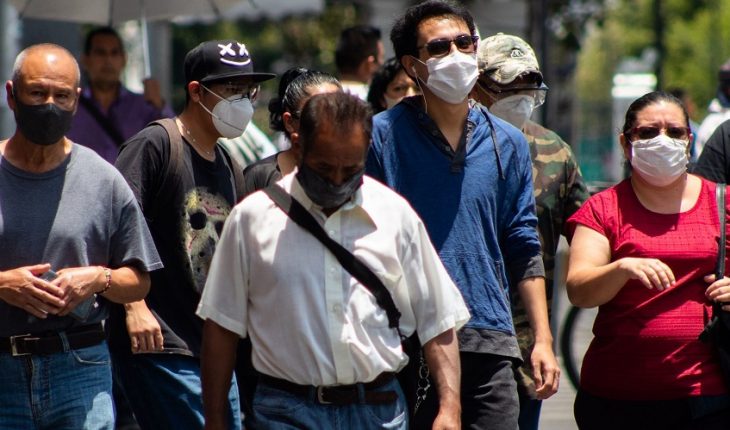Caesar sighs on the other side of the phone and lets out a sound ufffff, rounding with a nervous, awkward giggle, then repeating aloud the reporter’s question: “What would you do if you felt covid symptoms? Would you or wouldn’t you tell my company?”
“Honestly, it’s very difficult to answer that,” he finally replies to the other side of the phone call. “Because if I said I feel bad, whatever it is, what’s going to happen in automatic is that they send to my house at least two weeks without a salary.”
“But… on the other hand… – he hesitates again for a few seconds. I’m also aware that if I didn’t say so I’d be exposing a lot of people who are my peers. So it’s a very strong dilemma.”
Find out: At least 11,000 workers report dismissals and abuses in the epidemic; organize national movement
Caesar’s name isn’t Caesar. He asks to be called that because he fears reprisals from the company he is still working for: maquiladora Eaton Cooper Bussman, a fuse manufacturing company that has a factory in Ciudad Juarez, Chihuahua, on the border with the United States.
The man then rushes to say that he knows he would be sent home with nothing in his pockets because, precisely, that’s what happened to him a couple of months ago, when he came to the company’s infirmary with the symptoms of what was later confirmed to be an allergy.
“They sent me to my house for a week and two days, and they paid me nothing. I had four days of vacation and they took them, and the rest of the days they also took them as if I had asked for leave without pay,” he says.
And her situation, the Juarense stresses, is certainly not the only one. “A lot of people are being returned like that,” he insists. And now that Chihuahua has returned to the red light for the new shot of contagions, he adds, the fear among his companions is that they return them with the argument of protecting them, but without a penny of a salary that, in itself, is scarce: 198 pesos a day.
“There is a lot of fear among workers, and that’s why no one wants to step forward,” says Caesar, who explains that fear is grounded by what happened last April. At the time, the approximately 500 employees working in this maquila protested that there were no health measures needed to work in the pandemic. So they stopped work on April 9 demanding that they be sent home with 100% of their salary, until the conditions were optimal.
But the protest backfired: “Many of those who raised their voices, sent them for human resources, and from there. out. Then, at the same time, they were told to offer you some money so they wouldn’t file a lawsuit, pres presizing them that labor lawsuits can take years to proceed, and that was it. Most accepted the agreement because they didn’t have any left.”
And so, for fear of raising his voice and running out of work, Caesar believes that many like him also face the same dilemma of warning the employer or not in case his health worsens in these pandemic days.
“The company doesn’t give us that security, that trust. On the contrary! He exclaims, angry. They’re forcing us to hide. To be sick and not say it and go to work anyway. Because we know that if we say we’re sick, whatever it is, they’re going to come back to us and they’re not going to pay us the days.”
And now less than ever, he stresses, they can be without a salary, no matter how minimal. Less so can they afford to lose IMSS health insurance; the only lifeguard that millions of workers cling to to access public health in this pandemic.
Complaints are fired in pandemic
As Caesar explained, his case is not unique.
On the contrary, in addition to thousands of loss of human life – more than 97 thousand in Mexico until November 13 – the pandemic has also generated a wave of complaints and complaints of labor disputes.
This is seen in the official figures of the Federal Workers’ Attorney’s Office (Profedet), a deconcentrated body of the Ministry of Labour that, until last October, has received 191,000 requests for advice for worker complaints, up 25% compared to all of 2019.
And, of that total, at least 82,000 cases, 42%, took place only during the pandemic, between April and October, when workers mainly reported cases of unjustified redundancies, arbitrary wage cuts, non-payment of compensation, among other reasons.
The avalanche of complaints and requests for legal advice has been such that profedet had to open in April last year a ‘Digital Attorney’s Office’, where another 11 thousand 600 tRabajadores reported labour disputes over the Internet, also for unjustified layoffs, cuts, etc.
Faced with these figures, Profedet explains that it is privileging amicable reconciliation between employees and employers: so far, it has carried more than 6,100 reconciliations, in which its lawyers have managed to recover 385 million pesos for complaining workers.
“In the Profedet, the first thing we are going to do is try to reach a friendly agreement between the parties, because while it is true that there are patterns that are abusing, there are also entrepreneurs who are having very serious liquidity problems, because they too have been greatly affected by the pandemic,” says Carolina Ortiz, holder of profedet.
However, the other great objective of privileging conciliation is not to reach the courts, to labour justice, where the size of the bottleneck is enormous: to the million unresolved claims prior to the health contingency – some at 25 years old – another 3,375 lawsuits brought by profedet this 2020 must be added.
Carolina Ortiz says she hopes that, as of November 18, when the new model of labor justice enters into force, that in its initial stage will change in eight entities of the country the conciliation boards by courts in which quick conciliation hearings will be privileged, without coming to trial, justice will speed up the passage.
But, while that happens, this bottleneck is the battering ram that multiple companies are holding on to in this pandemic, says Susana Prieto, workers’ and workers’ advocate for the maquiladora industry in Chihuahua and Tamaulipas, on Mexico’s northern border.
That is, explains the labor lawyer, there are companies that are using the argument of ‘because report me, your judgment is going to take years’ for employees to accept, for example, pay cuts of up to 60%, or to agree to go home for several weeks without pay, or to fire them.
“They run you without giving you a weight. And, if you go with lawyers, as two months later they look for you and offer you a friendly agreement for very little money telling you that, either you accept and sign that, or your case is going to get stuck years,” says César, the employee of a maquila in Ciudad Juarez.
“The companies catch you in a moment of tremendous emotional and economic instability, and tell you: sign here, and if not, because we don’t give you anything,” adds Rosa Andrea Montero, whose partner, the Veracruz César Augusto Fernández, died a victim of Covid 19 after catching the oil boat on which he worked.
When Carolina Ortíz, holder of profedet, is asked this situation, the immediate response is that, under federal labour law, “there is no legal justification” for this to happen.
And so has the Secretary of Labour, Luisa Alcalde, who since last April has warned in multiple forums that employers cannot fire their workers or unilaterally modify the conditions of their contracts under the pretext of the pandemic. Since doing so is an “illegality”.
However, lawyer Susana Prieto criticizes that “it was a mistake from minute one” not to include these written warnings in the sanitiary emergency decree issued on March 30. Because this, he says, is being the gateway so that cases like Caesar’s are repeated in the maquilas of Chihuahua and Tamaulipas, and in much of the country.
And it’s not the only legal slit, Prieto adds. For example, covid 19 is not regarded as a working disease, but as a common condition, is exempting employers from any responsibility for risking their employees to work in pandemics, even if they are not considered essential companies. And this, in turn, gives them the full legal advantage of not paying compensation in cases of employee deaths that were spread by Covid during the exercise of their duties.
The lawyer explains: “At the beginning of the pandemic, it was being considered a working disease, and that is why it was possible that in the face of the first deaths of employees they would pay relatives 100% of the compensation. But since July, when by pressure from entrepreneurs it has ceased to be regarded as a working disease, this situation has changed. And now, entrepreneurs are much more protected because you can no longer blame them for risking their employees.”
But labor risk exists, Caesar emphasizes. For example, in your case it ensures that there is no healthy distance on buses full of employees transporting them from various points in the city to the factory. And, although they are given a cloth cover every day, and a lack of protection, he says that avoiding contagion in a place where at least 500 people work “is practically impossible.”
Political Animal looked for Eaton Cooper Bussman to ask for an interview or position. But at the time of publication this report he had not offered an answer.
“To the three faults… you lose your job”
Maria is 47 years old and also from Ciudad Juarez, Chihuahua. She does not work for the maquila, but the pandemic has also been affected.
In a phone interview, the woman says she has two children, one 19 and one 14 years old. And that her husband Eduardo Navarro, a Duranguense she met 21 years ago, worked as a watchdog for a security company that serves in a sports unit in Juarez.
Mary is not right to say exactly how long Edward had been working in the unit. After aloud, he says that “many years,” although he admits that, on paper, he had only two, “because every now and then they said goodbye and rehired him so that he would not be old.”
Still, the woman claims that her husband was happy in his work: “She didn’t earn much, but she was fascinated.”
By May 9, Eduardo began to feel unwell. He had high temperature, severe bone pain, and early breathing difficulties. “I’m made to bring the Covid, ” he told his wife.
Still, Eduardo showed up for work, as usual. There he also warned that he was not feeling well, that he believed that he was a carrier of that coronavirus that they talked so much about on television. “But your supervisor did nothing, ” laments Mary. “They didn’t give him a sad cover. And they also didn’t tell him to go back to the house for two or three days to rest.”
The next day, Edward re-introduced himself, despite Mary’s claims. “I was telling him why he was going if he felt bad, that no one would thank him. On the contrary, if anything happens to you, they just replace you with someone else, and that’s it.” But Eduardo denied with his head and, stubbornly, insisted that it was his duty to do his job, besides that, obviously, they needed the salary. “If he didn’t show up, he wouldn’t get paid for the day.”
Soon after, the symptoms worsened. Eduardo had no choice but to phone his supervisor, to warn him that he could not go to the sports unit that day. The answer they gave him, Mary says, was that he had to carry in person a role in which he found out he was really sick. “Or else, the three faults lost their jobs.”
But the insurance hospitals where he had to be issued with that document were already saturated by then. “They no longer received anyone, or they said yes, but to come back in five days,” says Mary, still with agony in her voice.
So they spent several days, looking for a place to attend to. Until May 26, when he was already being moved to a clinic, Eduardo died aboard an ambulance.
“The company didn’t take care of anything at the time either. Neither of the funeral nor of anything,” says Maria, who even points out that the company also did not pay her husband for the two weeks she did not go to work.
After the tragedy, Maria turned to labor lawyer Susana Prieto to defend her husband’s rights. When asked what the company demands, the woman says she just wants the right thing. May they at least acknowledge the unworthy treatment they gave Eduardo and be paid for those two weeks he was incapacitated and what was due to him for his years of work.
“We don’t ask so much. Just the right thing to do, what it is,” says the woman, who nevertheless stresses that her main pain is the treatment they gave her husband.
“The hospitals were saturated, it’s true. But many in their homes are being relieved. Maybe if the company had given him a chance from the start of coming to the house to take good care of himself, he might have improved. And maybe he’d still be here with me, with his children, with us.”
What we do at Animal Politics requires professional journalists, teamwork, dialogue with readers and something very important: independence. You can help us keep going. Be part of the team.
Subscribe to Political Animal, receive benefits and support free journalism.
#YoSoyAnimalEl the other pandemic: 25% worker complaints about labour abuse increased first appeared in Political Animal.





